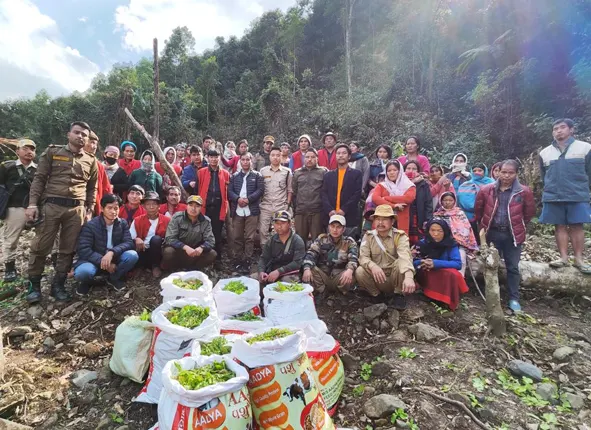[ Amar Sangno ]
YINGKIONG, 5 Feb: Sometimes social healing is more effective than the punitive actions enshrined in the Narcotic Drugs & Psychotropic Substances (NDPS) Act, 1985, in the war against drugs.
As part of its war on drugs, the Upper Siang district police have adopted a unique strategy – what they call ‘social approach and community policing’ – to weed out home-grown poppy cultivation by involving the village elders, students and community leaders.
The district police, led by SP Jummar Basar, have taken the community leaders of three villages – Sikko, Bine and Sibuk – inhabited by the Adi Pasi community – into confidence and persuaded them to issue “a social declaration that no opium will be cultivated in the mentioned villages from this year.”
Reportedly, Upper Siang is one of the districts where poppy cultivation is practiced widely.
In 2021-22, 10 cases under the NDPS Act were registered by the district police in its war against drug supply and abuse in the district. It was also reported that around 65 people were arrested.
However, on 20 June, 2022, Pongging village became the first to completely shun opium cultivation by voluntarily adopting a ‘no drug policy’. The move was appreciated by the state government.
“SP sir’s social approach to fight against drug or opium is very encouraging and promising. So, we voluntarily supported his idea and resolved that, from now onwards, we will not cultivate opium in our area,” said ZPM Nano Moyong.
“We have realised that this social approach by taking the village elders and community and student leaders into confidence is much more effective than legal action. That’s why we have joined this campaign. Our youths and villagers are also supportive,” the ZPM added.
In a written declaration addressed to the SP, the villagers on Saturday pledged not to grow opium in the future, “whatever situation may come.”
The villagers issued the declaration through the local kebang, and affirmed their alliance with the district police in the fight against the drug menace.
Some of the villagers pledged not to allow any villager to grow opium, saying that they would “not tolerate anyone selling substances contravening the NDPS Act,” and vowed to inform the police if anyone is found indulging in such practices.
The declaration was followed by voluntary destruction of the poppy crops in the village’s jurisdiction by men and women, including the GB and panchayat members.
“Though poppy cultivation used to be the main source of rural economy in our region, seeing its menacing effects on society and our future generations, we have resolved to shun this practice,” said Kato Mengu, general secretary of the All Pasi Students and Parents Association, who spearhead the campaign against drugs along with the PRI leaders and the police.
“From the legal aspect, cultivating opium is a criminal act. We can dissuade the villagers because we cannot afford to fight a legal battle in case someone is booked under the NDPS Act. For an alternative source of income, we will shift to horticulture, as we are blessed with fertile land,” Mengu added.
The SP shared his idea behind the campaign with The Arunachal Times.
“The vision behind the entire operation is to motivate our society to stand against drug abuse as a whole and shoulder responsibility against it,” Basar said.
“We feel that the fight against drugs cannot be the fight of the law enforcement agencies only. The agencies cannot do it until society comes forward and contributes. No government policies or their implementation can rescue the society unless society itself rises up to the occasion,” he said.
The SP informed that “the recent developments show a ray of hope in the widely poppy cultivated district.”
“I hope that the people will stand their ground in the face of all odds and join with the police department in the fight against the drug menace,” he added.



